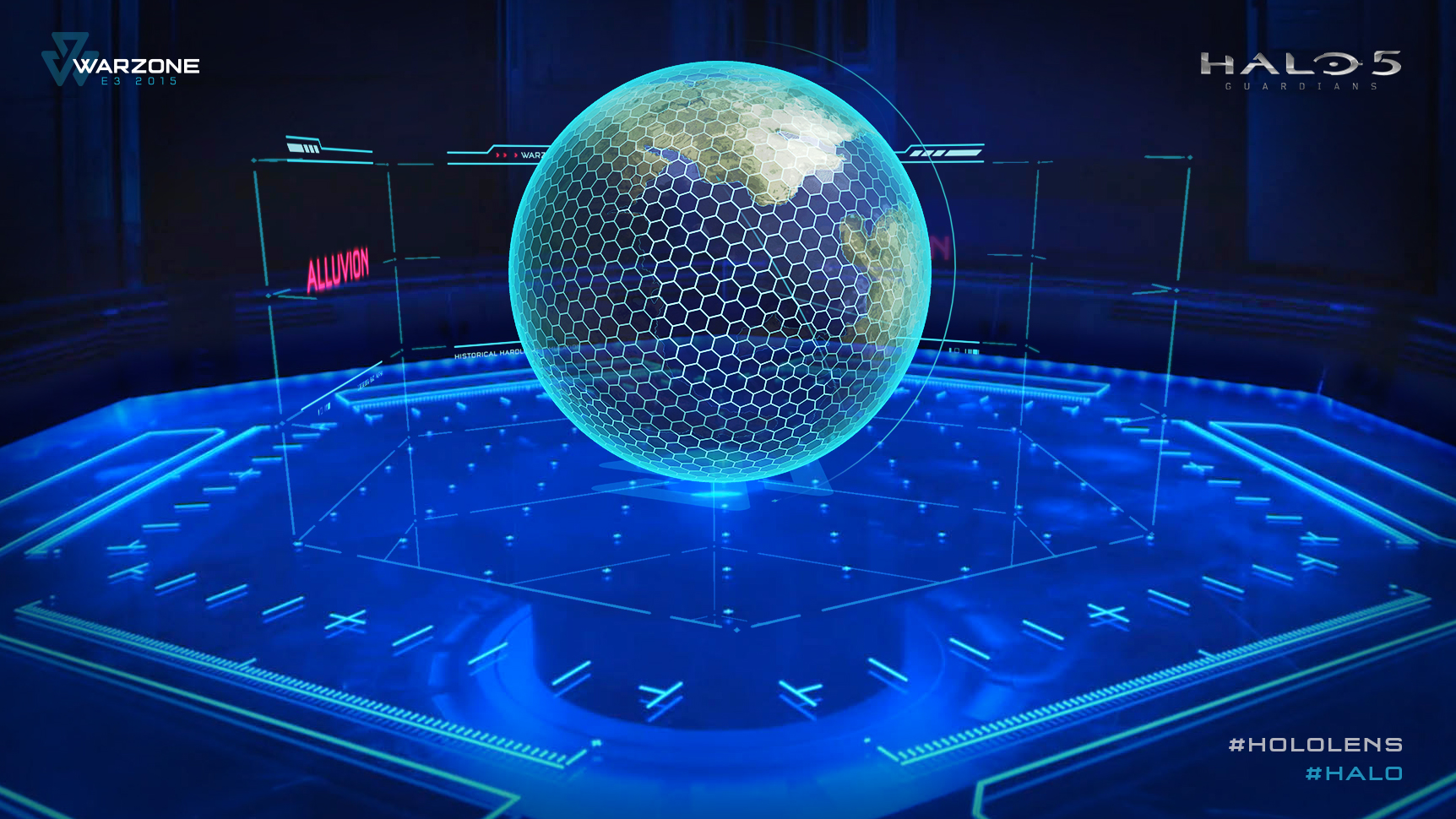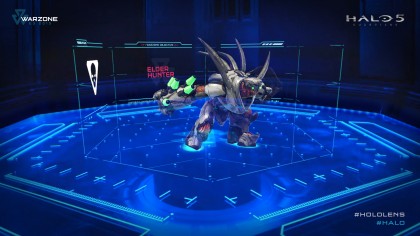
(Editor's note: I wasn't able to take photos of the experience due to Microsoft's no-photography policy. The following images are provided by Microsoft's PR team.)
I was standing in line at Microsoft's booth at E3 2015 when someone in a lab coat put a small, gray box up to my eyes. A doctor was the last person I expected to see at a major gaming convention. He wrote a "59" on my badge before moving on to the next journalist. I had no idea what the number was for but, honestly, weird things happen all the time at E3 and never get an explanation.
What that number was for, I would soon find out, was my Microsoft HoloLens Halo "Warzone" briefing - a new multiplayer mode in the upcoming entry of the seminal shooter. The man in the lab coat was measuring the distance between my pupils in order for the holographic projection to line up inside my field of view.
The line passed quickly and within five minutes I found myself inside a mock hangar that looked surprisingly akin to a pelican from the Halo universe. Considering I was about to step into a match of the upcoming Halo 5: Guardians for Xbox One, this made sense.
• Here's everything you need to know about Microsoft HoloLens
Gearing up with a little help of the on-site "spartans" (read: paid employees with cool ID name tags), I put on the HoloLens and was greeted by the flat, penetrating voice of Jennifer Hale, of Mass Effect and Halo 4 fame. I knew she wasn't really talking to me through a radio and that this was all pre-recorded audio, but the voice quality of the HoloLens added a level of realism that other demos at E3 couldn't. She told me to hold on while a graphical overlay, like the one in the Halo series used to find your way from point A to point B, popped into my field of view.
She instructed me to get up from the bench and walk down the hall to the first checkpoint - a typically mundane task made exponentially more difficult when wearing augmented reality glasses. It didn't help that the HoloLens slipped from time to time and, worse, holographic images only take up about 10-15% of your field of view while wearing the AR goggles, making it hard to keep a small size pin in your sights at all times.
Sign up for breaking news, reviews, opinion, top tech deals, and more.
The first "checkpoint" was in the middle of the hall. My disembodied spirit guide asked me to look out the pod bay window, i.e. a small gray unremarkable porthole on the wall that was, as far as I could tell, completely blank.
Then something started to happen. Like the scene from Star Wars when Luke is looking out into the Death Star's loading bay, I saw vehicles (scorpions, warthogs and mongooses) as well as far-off Spartan soldiers scurrying around, loading weapons into drop-ships in the virtual world beneath the platform I was standing on.
They were prepping for my match. The scene looked believable - if a bit contrived to add a showroom "wow" factor. Models were crisp and the animations looked fluid and natural.
Then the pod bay "window" closed and I was told to continue down the hall to the war room.

The war room was a circular shell with a four-foot wide pedestal in the center and handlebars around the edge. Floating in the center of the surface was a model of a UNSC Leviathan Supercarrier (if you don't speak Halo lingo, imagine a really big star ship). I could inspect the ship by moving around it in 3D space, and could pull up information on key parts like the bridge, the engines and the weapons systems by focusing on them with my eyes.
Here's where I ran into my first snafu. By leaning in to read the description text, I inadvertently changed the part of the ship I was looking at, but repositioning myself back two steps made the text illegible again. I had about five minutes of this before I gave up and simply enjoyed the ambiance of being inside a set for one of my favorite franchises.
But it wasn't until my teammates entered through the hall with the pod bay window that the really impressive part began. The supercarrier disappeared and in its place was Spartan Captain Sarah Palmer. She told us that we (myself and my team of 11 other space warriors) were about to embark on a training mission against another team. The skirmish was based on a famous battle in the Halo universe where two sides try to control three key points while fending off both the enemy and the hostile alien life.
Palmer faded away, and before me was a map of the battlefield. Just like she said, I saw the two main bases and then three small outposts in the middle of the map. Palmer told us that taking and holding the three key points would unlock the other team's power core, and that the longer we held them, the more powerful weapons she'd provide.
She described where we could expect to run into alien life and how eliminating them when we're confronted would give our team some sort of attrition in our battle. It was the first to 1,000 points, gained by killing enemy troops, taking strong points, hurting the enemy core and wiping out any hostile alien life that got in the way.
The HoloLens tutorial got me prepped to play Halo 5's new 12-vs-12 warzone game mode without a boring video or a simple instruction sheet. It was visual, interactive and provided me the exact instructions I needed to get into the game and perform like the soldier I was posing as. We took off the HoloLens before actually playing (there's no way to combine the Xbox One and HoloLens yet), but my team went on to win the match 1,000 to 245. One explanation is that our expertly lead demo, combined with a 3D map, gave us the insight to win. Another idea is that my team had the better combination of skill, luck and experience to beat out a bunch of new players.
Whatever it was, it was an impressive - if somewhat impractical - way to introduce players to a brand-new concept in Halo 5. Not everyone has a war room in their home, nor a life-like hangar that looks like it's been ripped out of a sci-fi flick. Without these I would've been walking through the white-washed walls of my home, only to sit at my dining room table, before returning to my bedroom to actually play the match.
But, while it errs on the side of ridiculousness to port this experience over 1-to-1 to gamers, using HoloLens as a way to give players a visual tutorial has a lot of potential. Despite its current drawbacks, if this is the future of video game how-tos, I'm all in.

Nick Pino is Managing Editor, TV and AV for TechRadar's sister site, Tom's Guide. Previously, he was the Senior Editor of Home Entertainment at TechRadar, covering TVs, headphones, speakers, video games, VR and streaming devices. He's also written for GamesRadar+, Official Xbox Magazine, PC Gamer and other outlets over the last decade, and he has a degree in computer science he's not using if anyone wants it.